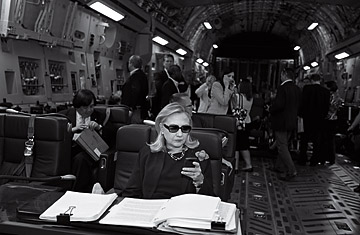
Clinton aboard a C-17, on her way to meet with rebel leaders in Tripoli.
(3 of 6)
The behind-the-scenes work intensified after Gaddafi fled Tripoli. A little after noon on Sept. 22, Clinton arrived at the offices of the Qatari mission to the U.N. overlooking New York City's East River for a meeting with the Qatari Emir, Sheik Hamad bin Khalifa al-Thani. Al-Thani, the burly, independent-minded patron of al-Jazeera who ousted his father in a 1995 coup, is a crucial Arab representative in the coalition Clinton assembled to go to war in Libya. He is also a deeply influential backer of several of the Libyan rebel figures who ousted Gaddafi from Tripoli. Clinton, worried that rebels would turn on one another and push Libya into chaos, urged al-Thani to encourage the rebel militias to unify.
Al-Thani said he'd do his best. But he worried that other allies' support for the struggling rebel leadership might flag with Tripoli having fallen--and that Gaddafi might launch a counterattack. He asked Clinton to convene the allies later in the day for an emergency meeting. By 5:30 p.m., Clinton's staff had brought representatives of the U.K., France, Italy, Qatar, Jordan and other countries together in her suite on the 34th floor of the Waldorf-Astoria hotel a few blocks away. Clinton, who purposefully mixes a politician's cheerful warmth with a lawyer's face-the-facts arguments, harangued them to step up to the plate. The situation in Libya "could spin out of control very quickly," she told the diplomats, who wound up pledging continued attacks against loyalist forces and renewed support for the rebel leadership.
Clinton sees this "convening power" as the key to rebuilding U.S. influence overseas. "One of the big questions that I certainly faced becoming Secretary of State is, O.K., we're ready to lead. Are there others ready to be there on whatever agenda we are seeking? There was a lot of broken pottery, so to speak, in our relationships." Libya, Clinton says, gave her a chance to demonstrate that the U.S. could form coalitions with new allies as well as the ones we all know from history books. That convening power is in turn part of what Clinton calls smart power: the use of everything from public diplomacy and new media to development aid and public-private collaboration to protect and advance U.S. interests abroad in ways America's military power cannot.
Clinton has also pushed State to collaborate with nongovernment groups, which is something of a departure from past practice. She has formed joint ventures with countless organizations, funding 67 programs dedicated to the rights of women, which offer a new flank against traditional forms of repression overseas and a cost-effective way to promote both security and development. The guiding national-security principle of the early George W. Bush Administration was that too much international cooperation weakens America, but Clinton has supporters in both parties who say boosting cooperation has produced results.
At a July 2010 meeting in Hanoi of the Association of Southeast Asian Nations, which the U.S. had just joined, Clinton bluntly pushed back against China's newly expansionist rhetoric about the oil- and gas-rich South China Sea, over objections from senior aides like the late Richard Holbrooke. The result, say China experts, has been a newly energized coalition against Chinese territorial aims in the region.
Constraints at Home
